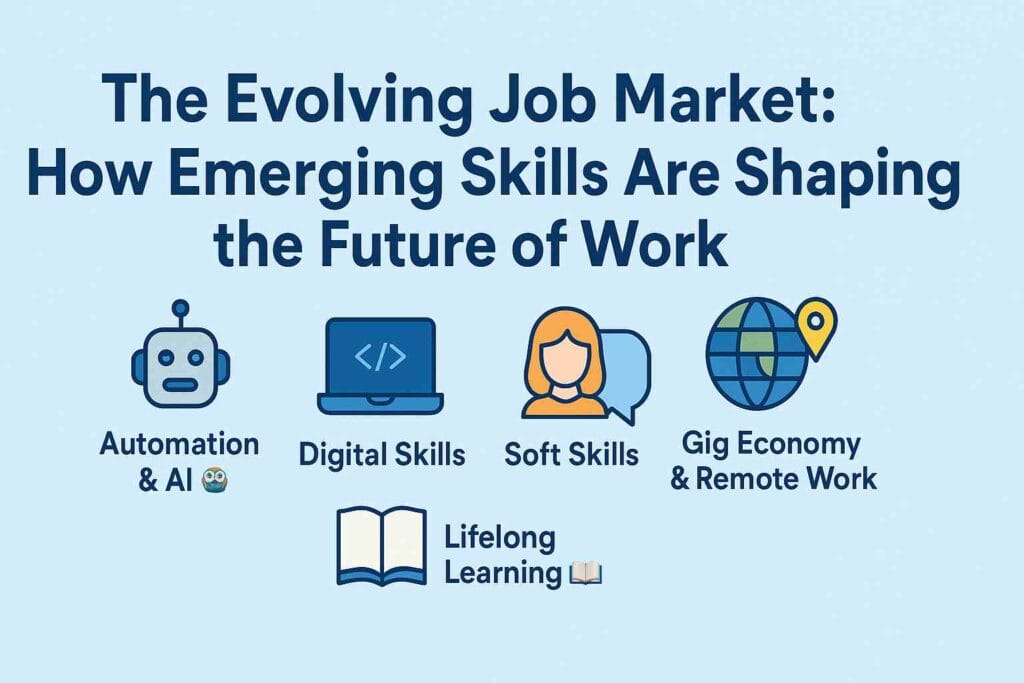The Evolving Job Market: How Emerging Skills Are Shaping the Future of Work

The job market has been undergoing significant transformations in recent years, driven by technological advancements, globalization, and changing societal expectations. As we move further into the 21st century, the landscape of work continues to evolve, and emerging skills are playing a critical role in shaping the future of employment. In this article, we will explore the key trends that are influencing the job market and how individuals and organizations can prepare for the future.
The Rise of Automation and Artificial Intelligence
One of the most significant forces driving change in the job market is the rapid advancement of automation and artificial intelligence (AI). These technologies have already started to reshape industries, from manufacturing to healthcare, and they are expected to have an even greater impact in the coming years. Automation has the potential to eliminate routine, manual tasks, but it also opens up new opportunities for highly skilled workers in fields like AI development, robotics, and data analysis.
As automation continues to evolve, jobs will increasingly require employees to work alongside machines rather than be replaced by them. This shift emphasizes the importance of skills that complement AI and automation, such as problem-solving, creativity, and emotional intelligence. Professionals who can adapt to these technological advancements will be in high demand.
The Demand for Digital Skills
In a world where nearly every industry is being transformed by technology, digital literacy has become a fundamental requirement for most jobs. From basic computer skills to proficiency in programming, data science, and cybersecurity, digital skills are crucial for success in today’s job market. As more companies move to digital-first business models, the demand for workers with advanced digital skills continues to grow.
Emerging technologies such as blockchain, cloud computing, and the Internet of Things (IoT) are also creating new opportunities in fields like finance, supply chain management, and healthcare. To stay competitive, workers must continuously upgrade their digital skills to keep pace with the rapid pace of technological change.
Soft Skills and Human-Centered Roles
While technical skills are essential, there is also a growing recognition of the value of soft skills. As technology continues to automate tasks, human-centered roles that require empathy, communication, and collaboration are becoming increasingly important. Jobs in healthcare, education, and customer service, for example, require a high degree of emotional intelligence and interpersonal communication.
Additionally, the ability to work effectively in diverse teams, manage conflict, and think critically will be critical as the workforce becomes more globalized and interconnected. Employees with strong soft skills will be more resilient to automation, as these abilities are difficult for machines to replicate.
The Gig Economy and Remote Work
The gig economy and remote work have been major disruptors in the job market, particularly following the COVID-19 pandemic. With the rise of freelance and contract work, many people are moving away from traditional full-time employment in favor of more flexible arrangements. Remote work, in particular, has opened up opportunities for workers around the world to collaborate on projects regardless of location.
This shift has led to a growing demand for skills in areas like project management, digital communication, and time management. Workers who can effectively manage their own schedules and collaborate virtually are increasingly sought after in the new job market.
The Importance of Lifelong Learning
As the job market continues to evolve, one of the most important factors in career success will be the ability to learn and adapt. With technology advancing at an unprecedented pace, the half-life of skills is shrinking. Skills that were relevant just a few years ago may no longer be in demand, while entirely new fields are emerging.
To remain competitive, individuals must embrace lifelong learning. This means seeking out new training opportunities, attending workshops, participating in online courses, and staying informed about the latest trends in their industry. Employers also have a role to play in fostering a culture of continuous learning, providing employees with the resources they need to develop new skills and stay ahead of the curve.
Conclusion
The future of work will be shaped by a combination of technological innovation, societal changes, and the evolving demands of the global economy. As automation, AI, and digital technologies continue to transform industries, emerging skills will play a crucial role in defining the workforce of the future. To thrive in this new job market, individuals must develop a blend of technical expertise, soft skills, and a commitment to lifelong learning. By staying adaptable and continually updating their skill sets, workers can ensure their relevance in a world that is constantly evolving.
Source : Medium.com




